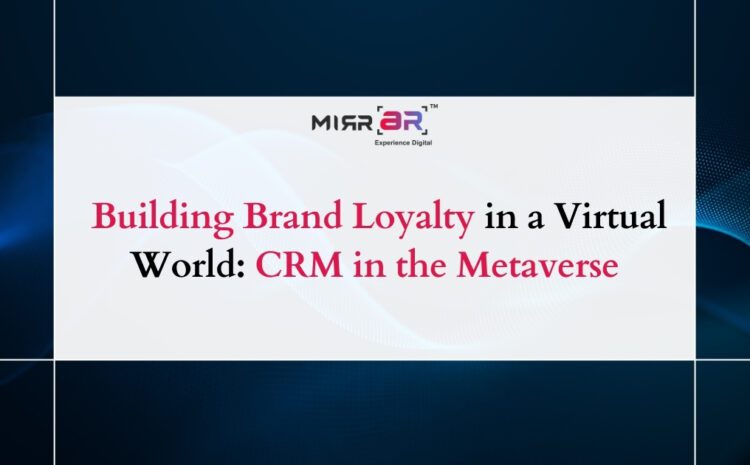The concept of brand loyalty has always been rooted in relationships. For decades, businesses have used loyalty programs, personalized services, and customer-first strategies to keep buyers coming back. But as the world of commerce evolves, so do customer expectations. With the rise of the metaverse—a virtual universe blending immersive experiences, digital identities, and interactive environments—the definition of customer relationship management (CRM) is being rewritten. In this new frontier, building brand loyalty isn’t just about discounts or emails; it’s about creating experiences that resonate in a fully digital, yet deeply personal, world.
Why the Metaverse is Changing Customer Relationships
The metaverse is not just another channel—it’s a paradigm shift in how consumers interact with brands. From attending fashion shows in virtual worlds to trying on luxury items via digital avatars, customers are no longer passive buyers. They are participants, creators, and community members. Traditional CRM, which revolves around collecting data, sending reminders, and tracking buying behavior, doesn’t capture the emotional and experiential aspects of this environment.
Here, brands must focus on building trust, engagement, and identity. Customers in the metaverse expect to be seen as more than data points—they want brands to recognize their digital personas, honor their individuality, and create meaningful interactions. The brands that succeed will be those that treat the metaverse as more than a sales platform—it’s a space to build lifelong relationships.
Personalization at a Whole New Level
One of the core functions of CRM has always been personalization, but in the metaverse, this concept expands dramatically. Instead of recommending products through email campaigns or website pop-ups, brands can deliver immersive experiences tailored to each customer. Imagine a beauty brand offering a virtual salon where a customer’s avatar can experiment with hundreds of styles, or a sportswear brand creating personalized training environments for fitness enthusiasts.
These experiences go beyond transactions—they create memories. The more immersive and tailored these interactions are, the stronger the emotional connection becomes. CRM in the metaverse isn’t just about sending the right message at the right time; it’s about crafting moments that reinforce the brand’s value in a customer’s digital and physical life.
Community Building as the New Loyalty
In the virtual world, customers aren’t isolated. They’re part of vibrant communities—gaming clans, fan groups, and digital collectives. For brands, this means loyalty can no longer be built in a one-to-one relationship alone. Instead, fostering a sense of belonging within communities is vital.
Brands can host virtual events, launch exclusive NFTs, or create branded spaces where customers not only engage with the brand but also with one another. For example, a cultural fashion label could organize a festival in the metaverse where users showcase their avatars in ethnic wear, blending tradition with technology. By enabling customers to connect and co-create, brands build ecosystems of loyalty that extend far beyond individual purchases.
Gamification: Turning Engagement into an Experience
Gamification has been part of marketing strategies for years, but the metaverse supercharges it. Instead of collecting points on a loyalty card, customers can earn rewards by completing quests, attending events, or engaging with digital experiences. A watch brand might create a time-themed treasure hunt in a virtual world, while a lifestyle brand could gamify sustainability by rewarding users who make eco-friendly virtual purchases.
This isn’t just fun—it’s loyalty in action. Gamified experiences deepen customer engagement, create anticipation, and encourage repeat interaction. CRM systems adapted to the metaverse must track these digital actions and use them to design future experiences that keep customers coming back.
Data, Trust, and Transparency
While immersive experiences drive loyalty, trust remains at the heart of every customer relationship. In the metaverse, where data collection can be even more granular—tracking gestures, voice patterns, and movement—customers will be increasingly concerned about privacy. Any misstep could erode loyalty instantly.
Here, transparency becomes a competitive advantage. Brands that openly communicate how data is collected and used, and that give customers control over their digital identities, will stand out. CRM systems in this new world must not only manage interactions but also safeguard trust by ensuring ethical data use and clear communication.
Bridging Physical and Virtual Loyalty
One of the most exciting opportunities for CRM in the metaverse is the blending of digital and real-world rewards. Imagine a customer who buys a virtual sneaker for their avatar and receives an exclusive discount on the physical version delivered to their doorstep. Or a loyalty member attending a virtual concert and unlocking real-world perks like event tickets or merchandise.
This bridging of worlds enhances the sense of value and keeps loyalty programs fresh and exciting. Customers no longer see brand interactions as separate between online and offline—they become a seamless continuum of experiences.
Preparing for the Future of CRM in the Metaverse
For brands, the challenge lies in adapting quickly. Traditional CRMs will need to evolve into immersive relationship systems capable of handling avatars, digital assets, and virtual interactions. Marketers must learn to design campaigns not just for screens but for immersive environments where storytelling, interactivity, and community are key.
Equally important is the mindset shift—brands must view the metaverse as more than a trendy channel. It’s an opportunity to redefine how relationships are built, how loyalty is earned, and how trust is maintained in a world where the line between digital and physical is blurred.
Conclusion
Building brand loyalty in the metaverse is about embracing the future of relationships. Discounts, emails, and static programs alone won’t cut it. Instead, loyalty will stem from immersive personalization, community-driven experiences, gamification, and trust. Brands that understand these shifts and adapt their CRM strategies will not only survive but thrive in the virtual era.
The metaverse isn’t replacing loyalty—it’s reshaping it. And for businesses willing to innovate, it offers the chance to create bonds with customers that are more meaningful, lasting, and exciting than ever before.
